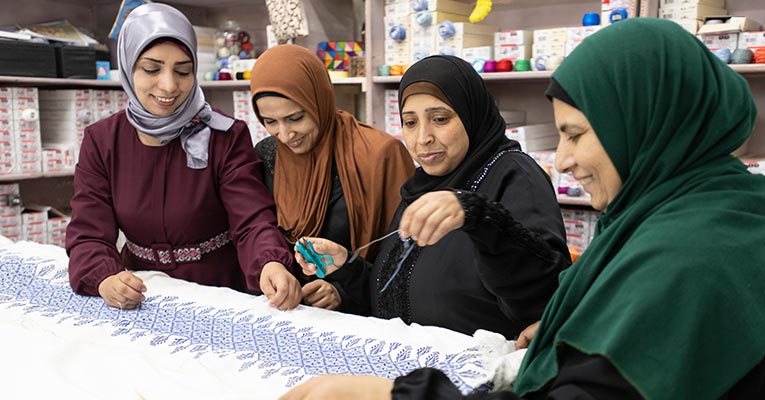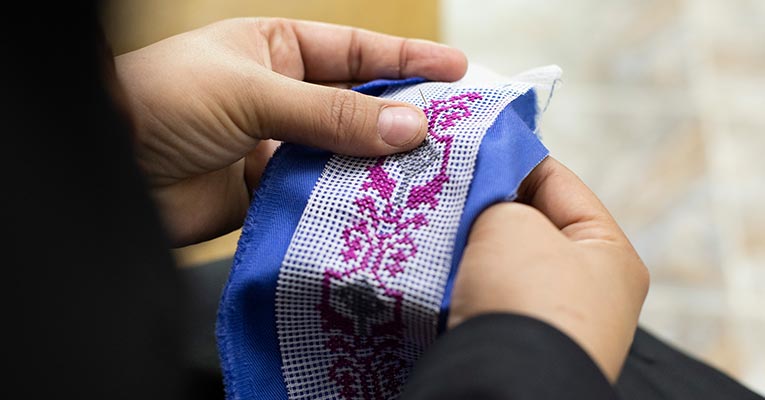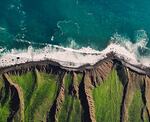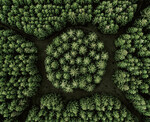rethink sustainability
The CLIC® Chronicles: SEP – a luxe, ethical fashion brand taking refugee women’s embroidery skills to Fashion Week

Interview with Roberta Ventura, Founder & CEO, SEP
Can you please tell us about SEP? What is behind the fashion brand and what’s its mission?
SEP stands for Social Enterprise Project and was founded as a pioneering, sustainable lifestyle accessories brand with the aim to bring thousands of refugees above the poverty line thanks to their own talent and craftsmanship.
Founded in 2013, SEP was the first private Jordanian company set up in the Jerash ‘Gaza’ Refugee Camp – a camp that has existed since 1968. SEP works with women in the camp to use their valuable hand embroidery skills. In doing so, SEP creates opportunities for economic and emotional independence for hundreds of women and their families. Our mission: to bring thousands of refugees above the poverty line, thanks to their own skills.
You were in investment banking for 20 years. What led you to create SEP?
I’ve been passionate about refugees and the Middle East since a young age. When I was studying business at Bocconi University in Milano, I wrote my thesis on the reconstruction of Lebanon after the civil war and the university helped me find an internship at Reuters, in Beirut, for my research. There, one of my colleagues was a refugee from the Ein El Helwe Camp in south Lebanon and I was able to convince him to take me to the camp. I had the opportunity to hear stories steeped in history, geography, identity, resilience, and survival. I was inspired by the stories I heard and that’s when I decided I had to play my part in generating a positive social impact within refugee communities. Yet, first I had to work and earn a living so I pursued a career in banking. But I never forgot the camps. And in 2013, I had the opportunity to go back to help a local NGO study the Jerash Camp in Jordan. At that point I had 20 years of banking under my belt and I could dedicate myself to my deepest passion. I studied the camp for the NGO and discovered that camp residents wanted to work and earn a living. They did not want another NGO.
So I decided to start a company to work with them, to break down the stereotypes around refugees and bring back dignity, beauty and independence to these incredibly resilient women. This was the beginning of SEP. Initially it was a side project but by 2016 it became apparent that it needed all of my attention and time if it was going to become a meaningful business. This is when I knew it was time to move on and change my career path.
We started working with 20 women. Today, we work with 600 SEP artists.
What do you think about the role of investors in creating a more sustainable fashion industry? Are you seeing consumer behaviour/consumption patterns change?
We recently closed our first round of financing and indeed the investors who are now involved in SEP have a clear vision and see us as one of the ways they can create a more sustainable fashion industry. Consumer behaviour patterns are also very encouraging. Since we started in 2013, we have seen a growing interest from customers who are seeking an alternative to traditional luxury brands and are interested in our story, mission proud to wear our brand and be part of it.
Read also: Sustainable fashion: how do we get there?
How does working for SEP improve the lives of the women in the camps? What is the end goal?
We work with Palestinian as well as Syrian refugees in Jerash camp, in North Jordan. We decided to start operations in the poorest and the most forgotten part of this camp, where women have not been considered “active economic agents” for the last four generations. These women we work with may remain refugees for the rest of their lives – or a new political solution may arise so they are free to return home. Either way, it is unfair to expect them to live in poverty while they are waiting. At SEP, we value their talent and offer them employment. It’s not philanthropy, it’s giving them an opportunity to be active and independent economic actors, to be part of a wider community, share their message and have a worldwide impact with their craft. We give them a purpose whilst they wait, a wage and an education in the camp. Furthermore, they develop their skills for what might await them outside the camp.
SEP was built on the specific craft of embroidery. Why this craft?
When you are displaced and become a refugee, you lose everything. The one thing nobody can take away from you is your heritage. It was important for us to base our business model around a skillset that celebrates the artists’ roots. Cross-stitch is by far the most well-known and widely used embroidery technique in the Middle East. It requires time, accuracy and passion. So this is why SEP put this ancestral craft at the forefront.
One of the SEP artists went as far as to tell me that in each piece she makes, she pours all her emotions and stories – she sees it as her message in a bottle.
You’re now a B Corp! What does it mean for you?
Becoming a B Corp is a difficult process, as you know all too well. But for us it was a priority to have a third-party audit which confirms that we mean what we say.
It keeps us accountable to our stated values as a company. Moreover, we want our customers to be proud brand ambassadors and we’d like to see more businesses in the world that balance profit and purpose.
And how do you plan to improve your score and have a better impact on people and the planet?
Positive impact on people is the core of our business. Besides creating employment, we organise social impact activities such as first aid or English classes for the SEP artists and their children on a regular basis and we will soon open a cultural centre which will host an array of activities mainly focused on children. For us, the next step is working on our impact on the planet. We plan to reach net-zero emissions in a transparent and measurable way as soon as possible. To do so, we started talking to several companies who might help us in this process and we are brainstorming the right course of action.
What will be your most important challenge in becoming net zero?
Our shipping partner Aramex uses biodegradable bags and both DHL and Aramex offer offsetting programs. Still, we are importing most raw materials such as our linen and cashmere from Italy to Jordan: shipping is where most of our carbon footprint is and we are looking to hire a third party who can calculate it and help us offset it.
Read also: Technology is at the heart of change for the transport sector
Where do you see SEP in the 5 next years? What’s your expansion goal?
Our ambition is to become a global brand in the next 5 years and hopefully we can get there. We are very excited to open the first SEP store in Berlin, in Prenzlauer Berg next month and we are looking for the perfect location in Zurich and Basel at the moment. We also plan to expand operations to other camps and other countries
What “tips” would you give to other fashion companies trying to have a better impact whilst retaining a sound financial business model? What about consumers?
I would refrain from falling for the temptation of shortcuts and I would build a model which is truly impact-focused (ie no greenwashing); sadly it takes longer and it is more costly to build a company this way, but it is worth it.
We’re in the midst of fashion weeks. What do you expect from this season?
We are very excited to have been invited to take part in Milan Fashion Week by its organisers Camera della Moda and we are looking forward to meeting press, buyers and fashionistas at the Designers Hub in Museo ADI. We’re taking part in an event focused on Ethical and Social fashion with a special focus on disadvantaged women and the victims of violence, immigrants and refugees. Another great sign that what we are doing is slowly becoming mainstream!
Read also: Making fashion take responsibility
What do you do in your daily life to have a better impact on the planet and be more sustainable?
Never enough! But as a family we are now avoiding meat and we are mindful of our impact on the planet when we plan our trips (we offset where possible, we do not travel as much anymore and we give priority to sustainable hosts). And as soon as our car comes to the end of its lifetime, we will switch to an electric one.
Wichtige Hinweise.
Die vorliegende Marketingmitteilung wurde von der Bank Lombard Odier & Co AG oder einer Geschäftseinheit der Gruppe (nachstehend “Lombard Odier”) herausgegeben. Sie ist weder für die Abgabe, Veröffentlichung oder Verwendung in Rechtsordnungen bestimmt, in denen eine solche Abgabe, Veröffentlichung oder Verwendung rechtswidrig wäre, noch richtet sie sich an Personen oder Rechtsstrukturen, an die eine entsprechende Abgabe rechtswidrig wäre.
Entdecken Sie mehr.








teilen.